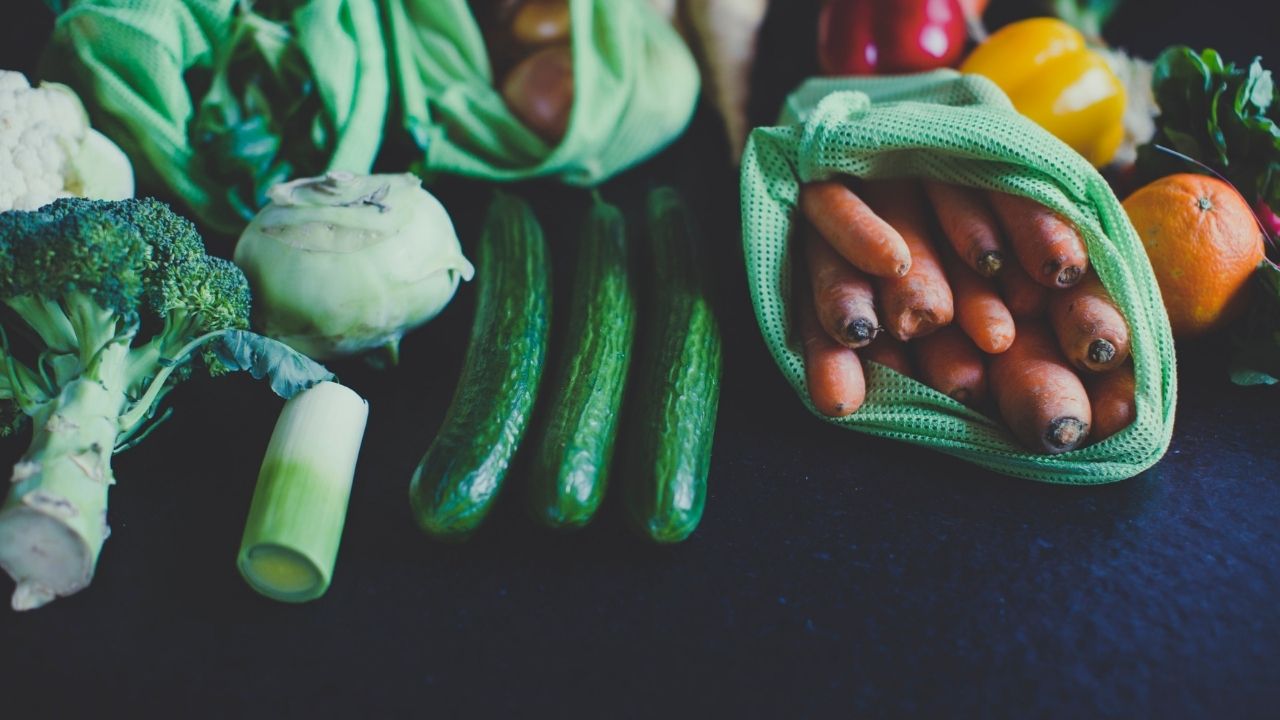Written by Gianina Padula. Reviewed by Diana Licalzi, MS, RD, CDE.
One of the most common misconceptions about the transition to a plant-based diet is that it will end up being expensive. However, this could not be further from the truth. On average, those eating plant-based typically save around $750 each year compared to what they would spend on their usual grocery bills (1, 2).
Additionally, incorporating more fruits, vegetables, whole grains, and plant-based protein sources is an excellent preventive health measure, allowing you to save potential healthcare costs in the future. Here are a handful of strategies to keep in your back pocket when shopping plant-based.
1. Opt for the bulk section.
Many supermarkets offer a bulk section where you can buy food in larger quantities and at a cheaper price. This is common for dry goods, such as nuts, grains, seeds, and dried beans. You can oftentimes bring your own reusable jars to fill -- just be sure to have a cashier weigh the empty container beforehand.
2. Find staple foods that you can incorporate into a variety of meals.
Great examples of staple foods include potatoes, beans, bananas, rice, and oatmeal. By using different types of spices or fresh herbs, you can develop a versatile list of meals to choose from that have similar bases. Spicing up your recipes is also a smart way to cut back on sodium since you won’t be relying on salt as much for flavor!
3. Consider buying some ingredients frozen or canned.
You can reduce grocery costs by 50%, and sometimes more, by buying frozen fruits and vegetables (3). Additionally, canned and frozen foods last much longer than fresh produce. This not only makes shopping easier, but it helps you cut back on food waste as well. Depending on what foods you buy frozen, your preparation time may also decrease.
4. Non-organic fruits and vegetables are better than no fruits and vegetables!
Everything you buy doesn’t have to be organic, so do not fret if these items are out of your price range. As long as you are prioritizing eating a variety of fruits, vegetables, legumes, and grains, you will get all of the nutrients your body needs. Remember to make your plate as colorful as possible, as this will help incorporate a myriad of vitamins and minerals.
5. Stick to whole foods rather than pre-made or processed options.
A helpful rule of thumb to remember is that the more steps that were taken to prepare the food you are buying, the higher the price usually is. Eating a whole-food, plant-based diet (WFPB diet) keeps costs low and nutrients high! Plus, you will be more confident in knowing what is going into your body.
We hope that these five tips have shown you that it is not as difficult as you would think to stay frugal on a plant-based diet. The key to a successful lifestyle change is making multiple small changes and incorporating them into regular habits. This way, you eventually will be able to perform each task without even giving it much thought. Although it can be intimidating at first, you will adjust before you know it by adopting one step at a time. Test one (or more) of these suggestions out on your next trip to the grocery store and let us know how it helped!
References:
Source 1:
Blackmore, W. Forget Saving The Planet: Being A Vegetarian Is Cheaper Than Eating Meat. TakePart. http://www.takepart.com/article/2015/10/12/vegetarian-diet-savings/#:~:text=According%20to%20the%20research%2C%20by,the%20federal%20MyPlate%20nutrition%20guidelines. Published October 12, 2015.
Source 2:
Flynn, M. Economical Healthy Diets (2012): Including Lean Animal Protein Costs More Than Using Extra Virgin Olive Oil. Journal of hunger & Environmental Nutrition. 2015. https://doi.org/10.1080/19320248.2015.1045675
Source 3:
Ericson, C. Cut Food Costs By Going Frozen, Without Sacrificing Health Or Taste. Forbes.
https://www.forbes.com/sites/learnvest/2017/03/06/cut-food-costs-by-going-frozen-without-sacrificing-health-or-taste/#19757ec556e9. Published March 6, 2017.
Jose Tejero is an exercise physiologist and two-time Ironman Triathlete. He holds a degree in Exercise Science from the University of Maryland and has over six years of experience working in the field of type 2 diabetes. Jose is currently working towards becoming a Clinical Exercise Physiologist and a Certified Diabetes Care and Education Specialist, combining his two passions: exercise and diabetes care.





I don’t know who to find the bio so I can watch your c